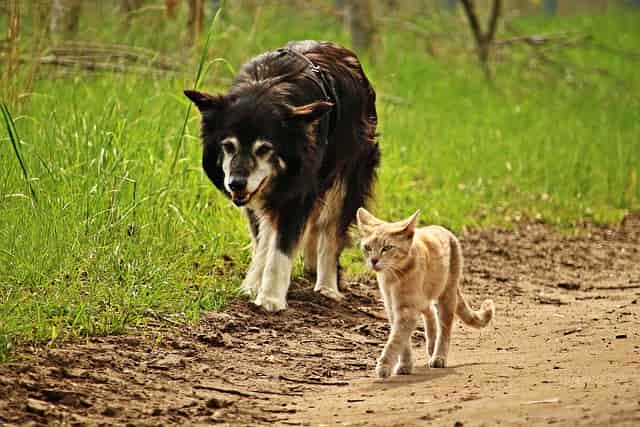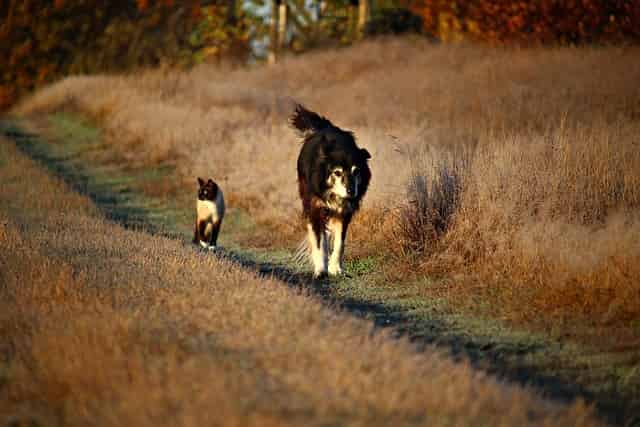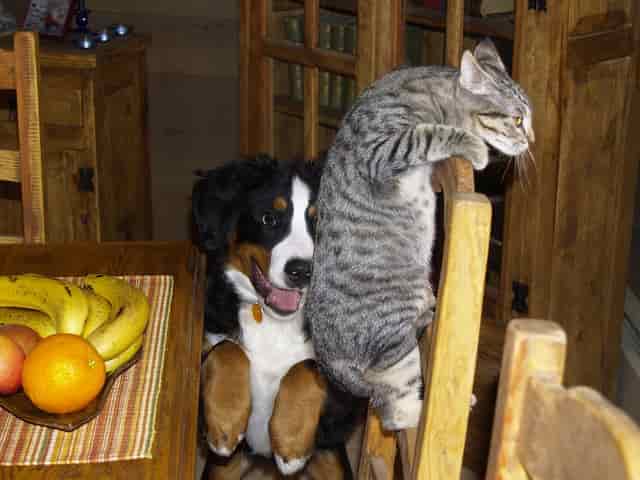
Border Collies are a highly trainable breed that excels in various activities, including obedience, agility, and flyball. However, when it comes to their compatibility with cats, many people wonder if Border Collies are good with felines.
The answer to this question is not straightforward. While some Border Collies can coexist peacefully with cats, others may show aggression towards them. The breed’s natural herding instinct can sometimes manifest as chasing or nipping at cats, which can be dangerous for both animals. Therefore, it is crucial to introduce Border Collies and cats slowly and under supervision to ensure a positive and safe relationship.

Border Collies and Cats: Can They Coexist?
The Border Collie Temperament
Border Collies are highly intelligent and energetic dogs that are bred for herding livestock. They have a strong herding instinct and are known for their intense stare, which can be intimidating to other animals. However, with proper training and socialization, Border Collies can be loving and patient companions.
Introducing Your Border Collie to Your Cat
When introducing a Border Collie to a cat, it is important to do so slowly and under supervision. Start by keeping them in separate rooms and allowing them to sniff each other’s scent through a closed door. Once they seem comfortable with each other’s scent, you can begin to introduce them while on a leash.
Training Your Border Collie to Coexist with Your Cat
Training your Border Collie to coexist with your cat requires patience and consistency. Use positive reinforcement techniques, such as treats and praise, to reward good behavior. Teach your Border Collie basic commands, such as “sit,” “stay,” and “leave it,” to help control their behavior around the cat.
It is also important to provide your Border Collie with plenty of mental and physical stimulation. Daily exercise, such as walks or runs, can help burn off excess energy and prevent behavioral issues. Providing your Border Collie with games and toys can also help stimulate their mind and prevent boredom.
In conclusion, Border Collies can coexist with cats if they are properly trained and socialized. It is important to be patient and consistent with training, and to provide your Border Collie with plenty of mental and physical stimulation. Always supervise interactions between your Border Collie and cat, and seek professional help if needed.
Border Collie and Cat Playtime
Toys and Games for Border Collies and Cats
Border Collies and cats can be great playmates when introduced properly. However, it is important to provide appropriate toys and games to avoid any potential issues.
Border Collies enjoy games that involve chasing and retrieving, such as playing fetch with a ball or frisbee. Cats, on the other hand, enjoy games that involve stalking and pouncing, such as playing with a feather wand or laser pointer.
Toys that encourage interactive play between Border Collies and cats can include puzzle feeders, treat-dispensing toys, and hide-and-seek games. It is important to supervise playtime and make sure that toys are appropriate for both pets.
Supervising Playtime Between Your Border Collie and Cat
When introducing a Border Collie to a cat, it is important to do so slowly and gradually. Allow them to sniff each other through a barrier, such as a baby gate, before allowing them to interact face-to-face.
Supervision is key when allowing a Border Collie and cat to play together. This is especially important if the Border Collie has a strong herding drive or prey drive. It is important to redirect any nipping or chasing behavior and provide plenty of mental stimulation and daily exercise to prevent behavioral issues.
Positive reinforcement and praise can be used to encourage good behavior during playtime. It is also important to provide plenty of distractions, such as toys and games, to prevent any potential conflicts.

Border Collies and Cats: Potential Challenges
Dealing with Border Collie Herding Instincts
Border Collies are highly intelligent working dogs with a strong instinct to herd livestock. This herding instinct can sometimes transfer to other animals, including cats. Your Border Collie may try to herd your cats by nipping at their heels or chasing them around the house.
To deal with this behavior, it’s essential to provide your Border Collie with plenty of mental and physical stimulation. Daily exercise, games, and training can help distract your dog from their herding instincts and provide an outlet for their energy. Positive reinforcement and praise can also help encourage good behavior.
Addressing Behavioral Issues in Border Collies
Border Collies can be prone to behavioral issues, including aggression towards other animals. This behavior may be exacerbated by their herding instincts and prey drive. It’s essential to address any behavioral issues in your Border Collie early on to prevent them from becoming a danger to your cats.
Socialization is critical for Border Collies to learn how to interact appropriately with other animals. Early socialization with cats and other dogs can help your Border Collie learn to coexist peacefully with them. If your Border Collie displays aggressive behavior towards your cats, it’s essential to seek professional help from a trainer or behaviorist.
Managing Border Collie Prey Drive Around Cats
Border Collies have a strong prey drive, which can make them a danger to cats. It’s crucial to manage your Border Collie’s prey drive around your cats by providing supervision and a barrier between them. Keep your cats in a separate room or provide a high perch where they can escape from your dog’s reach.

Frequently Asked Questions
Do Border Collies get along with cats?
Border Collies can get along with cats, but it depends on the individual dog’s temperament and the cat’s personality. Some Border Collies have a strong prey drive and may chase or try to herd cats. However, with proper socialization and training, many Border Collies can learn to coexist peacefully with cats.
How can I train my Border Collie not to chase cats?
Training a Border Collie not to chase cats requires patience and consistency. Start by teaching your dog basic obedience commands such as “sit,” “stay,” and “come.” Then, gradually introduce your dog to cats in a controlled environment, such as on a leash. Reward your dog for good behavior and redirect their attention when they show interest in the cat. With time and practice, your Border Collie can learn to ignore cats and focus on you instead.
Are Border Collies good with rabbits?
Border Collies have a strong prey drive, and rabbits are often seen as prey. Therefore, it is not recommended to keep Border Collies and rabbits together unsupervised. However, with proper training and socialization, some Border Collies can learn to coexist peacefully with rabbits.
Are Rough Collies good with cats?
Rough Collies have a more laid-back personality compared to Border Collies and may be more tolerant of cats. However, as with any breed, it depends on the individual dog’s temperament and the cat’s personality. It is important to introduce any new pets slowly and supervise their interactions.
What animals are compatible with Border Collies?
Border Collies can coexist with many different animals, including other dogs, cats, and livestock. However, it is important to supervise their interactions and provide proper training and socialization to ensure everyone’s safety.

How do I stop my Border Collie from herding my cat?
Border Collies have a strong herding instinct, and they may try to herd other animals, including cats. To stop your Border Collie from herding your cat, provide plenty of exercise and mental stimulation to help them burn off excess energy. Teach your dog basic obedience commands and redirect their attention when they show interest in the cat. With patience and consistency, your Border Collie can learn to control their herding instincts.
Are Border Collies Good with Children?
Yes, Border Collies are generally good with children. They are known for their intelligence, energy, and loyalty, which can make them great family pets. However, it’s important to note that every dog is different and has its own personality, so it’s important to socialize and train them properly to ensure they are comfortable and safe around children. It’s also important to supervise interactions between children and dogs to prevent any accidents or misunderstandings.